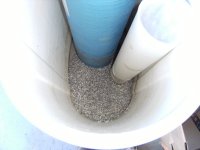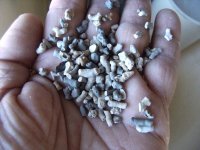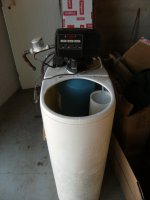Leigh Dodd
New Member
Hello - Water softener newbie here 
I've been given an old water softener, I think it was connected to a well supply in the pass. and don't know how old it is, of how long its been standing.
The electronics appear to light up (Pentair International 5600SE) which appears to be the same as a Fleck 5600se (I've found a service manual for the Fleck which is good)
On reading loads of info on the net, I have one question about some gravel in the salt tank (see pic attached)
I've heard that the resin tank sometimes has small gravel as a filter in some systems, but this is in the salt tank and looks "odd"
Before I start trying it out to see if it works etc, does the gravel need to be in the salt tank ?
BTW. will be connecting to the town water supply and not a well water
Thanks
Leigh
I've been given an old water softener, I think it was connected to a well supply in the pass. and don't know how old it is, of how long its been standing.
The electronics appear to light up (Pentair International 5600SE) which appears to be the same as a Fleck 5600se (I've found a service manual for the Fleck which is good)
On reading loads of info on the net, I have one question about some gravel in the salt tank (see pic attached)
I've heard that the resin tank sometimes has small gravel as a filter in some systems, but this is in the salt tank and looks "odd"
Before I start trying it out to see if it works etc, does the gravel need to be in the salt tank ?
BTW. will be connecting to the town water supply and not a well water
Thanks
Leigh



